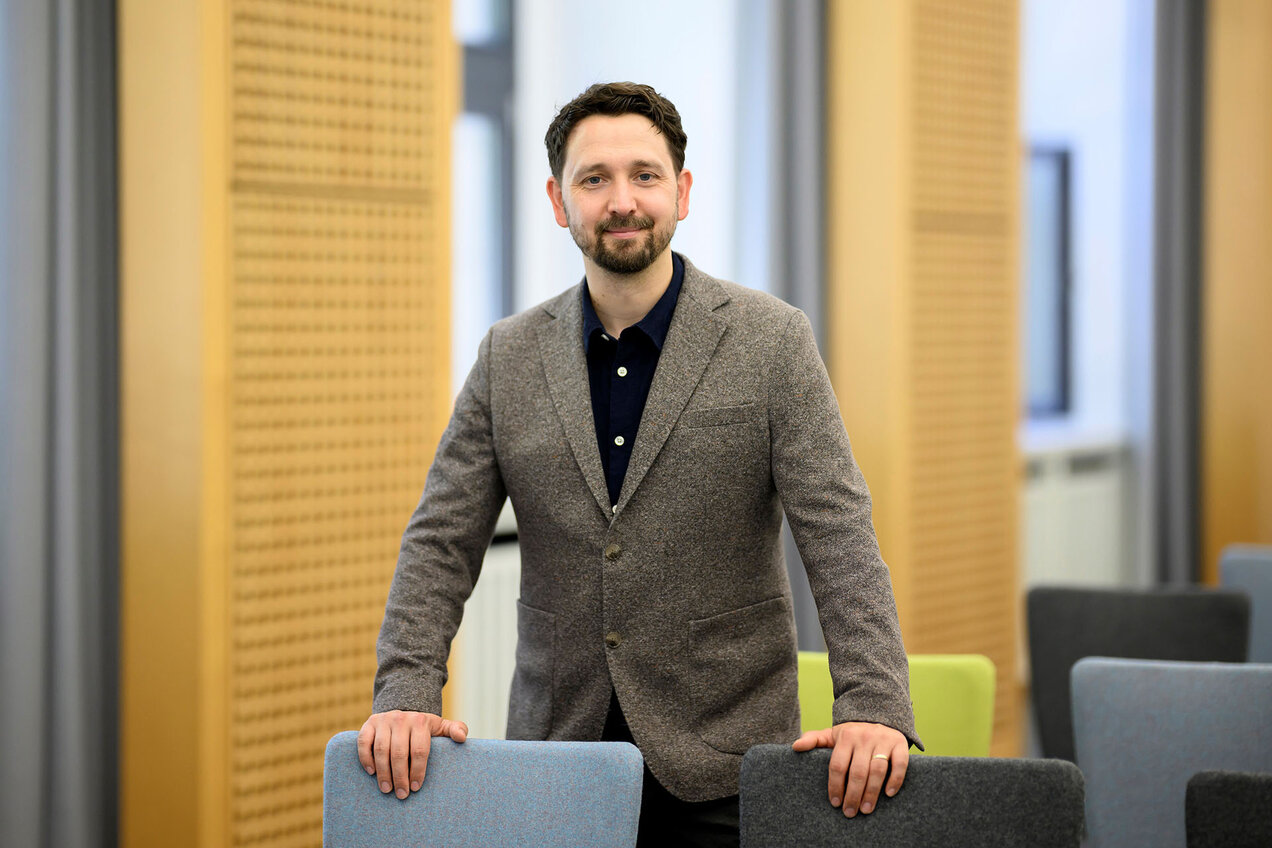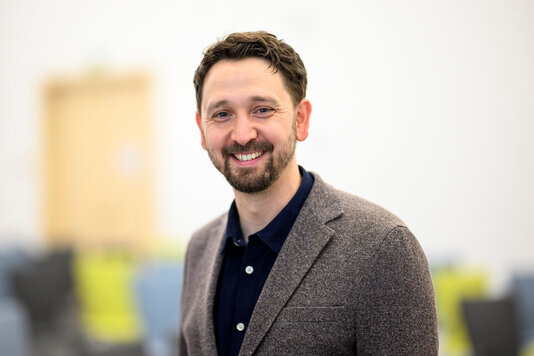
Interview with Florian Fastenrath
 ©
UDE / Anke Wälischmiller
©
UDE / Anke Wälischmiller
Socio-economic inequality is increasing in Germany. Nonetheless, redistribution is not a priority on the political agenda. As newly appointed junior professor, Florian Fastenrath investigates how inequality is publicly perceived and addressed in politics. His research group ‘Political Economy of Inequality’ will analyse what factors obstruct or enable progressive policies. In this interview, he explains how his research can contribute to a deeper understanding of social equity and how he intends to collaborate across disciplines, also with the humanities.
Comparative political economy embeds economic issues in their social and political context. Hence, it considers not only economic mechanisms, but also power relations, interests and social conflicts – for example in tax and social policies or in industrial relations. Particular attention is on the political dimension of far-reaching social transformations such as growing social inequality, financialisation, globalisation, the rise of populist movements – and increasingly so the political-economic dimensions of climate change.
At the College, I would like to examine how political and social actors address socio-economic inequality. With my research group, I would like to investigate which factors hinder or promote redistributive policies and why particular social groups remain systematically underrepresented. We analyse how citizens' ideas of redistribution and public opinion on inequality are formed, and how political parties perceive and process this public opinion. Empirically, we combine qualitative interviews with political actors, focus groups with citizens from different social backgrounds, case studies and survey data as well as media and discourse analyses.
"Even underprivileged population groups with a clear interest in redistribution do not automatically support measures such as a more progressive inheritance tax. A central explanation lies in normatively charged interpretation patterns that undermine public approval."
Over the last ten years, economic inequality has become more visible, but in political competition – especially in election campaigns – the topic usually remains marginalised. My research aims to understand the reasons for this. Among other things, it shows that even underprivileged population groups with a clear interest in redistribution do not automatically support measures such as a more progressive inheritance tax. A central explanation lies in normatively charged interpretation patterns that undermine public approval. I systematically analyse how these patterns emerge, spread and gain political impact. I am interested in which actors (re-)produce them, how they shape political decision-making processes and which social groups are mobilised or depoliticised as a result.
Specifically in the field of inequality, social scientists have overcome the classic “silo mentality” in the last two decades and advanced interdisciplinary research. My work sits primarily at the intersection of political science, socio-economics and sociology – in other words, within the social sciences. Within the humanities, political philosophy, history and communication sciences offer valuable perspectives. I would like to cooperate even more intensively here in order to better understand complex questions of justice, dominant discourses and social change.
What particularly appeals to me at the College is the combination of interdisciplinary collaboration and the opportunity to focus on socially relevant challenges such as inequality. Here, I can not only develop my own research ideas, but also benefit from the diverse perspectives and expertise of my colleagues. The College offers ideal conditions for innovative projects that combine political science, sociology, economics and the humanities.
The University Alliance Ruhr offers excellent opportunities for cooperation. I am particularly looking forward to working closely with the Institute for Socio-Economics at the University of Duisburg-Essen, which pursues social inequality as one of its focus topics. Here, I am involved in teaching and in the doctoral programme ‘The Political Economy of Socio-Ecological Transformation’.
Moreover, I see promising overlaps with the Institute of Political Science at the UDE as well as exciting interdisciplinary potential in the humanities – especially through a planned collaboration with the project group ‘The Deserving Rich’ at TU Dortmund University, led by Christian Neuhäuser (political philosophy), which investigates the public perception and legitimisation of wealth. I also intend to collaborate with the Historical Institute at the UDE and connect with ongoing projects at the Institute for Advanced Study in the Humanities (KWI) Essen – for example on capitalism and solidarity-based economy.
I am planning a series of workshops with international participation that will address current issues in comparative political economy as well as methodological challenges in inequality research. For example, I am planning to intensify the exchange with the Psychology of Inequality Lab at the University of California, Irvine in the USA. As part of an interdisciplinary cooperation with them, I would like to bring together social-psychological and political-economic perspectives on attitude research and perceptions of redistribution.
I am driven by the wish to systematically comprehend the causes and interdependencies of societal challenges. For me, this includes breaking new methodological ground – particularly when traditional approaches do not adequately capture key aspects of social reality. In my research group, we consistently pursue this approach: we work with methodological openness, analytical precision, and a profound interest in socially relevant issues. It is important to us to connect with current debates – through well-founded analyses with a clear empirical basis and theoretical reflection.
 ©
© UDE / A. Wälischmiller
©
© UDE / A. Wälischmiller
Prof. Florian Fastenrath
Junior Professor | Research Group 'Political Economy of Inequality'
Phone: +49 201 183 65 62
Florian Fastenrath is Junior Professor of Comparative Political Economy, with a research focus on inequality. His work sits at the crossroads of public policy analysis, comparative and international political economy, and political sociology. He is particularly interested in how socio-economic and political inequalities intersect, especially in the context of political representation.
His research explores both sides of the representation process: how citizens form policy priorities and preferences, and how political elites perceive and respond to public demands through policymaking. He is committed to methodological innovation, blending qualitative approaches such as elite interviews, focus groups, and deliberative polling to better understand public opinion and political responsiveness.
His broader research interests include the politics of inequality and redistribution, public finance, and financialisation. His work has been published in journals such as Comparative Political Studies, Journal of European Public Policy, and Review of International Political Economy.
Before taking on his current role, Florian Fastenrath held postdoctoral positions at the universities of Bonn (2023–25) and Duisburg-Essen (2020–23), and research positions at the University of Cologne, where he completed his PhD in 2019. He also served as Substitute Professor for Policy Analysis and Political Economy at RPTU Kaiserslautern-Landau (2024–25).